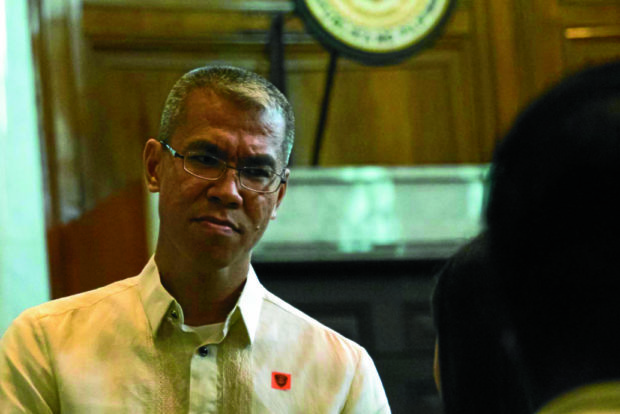SolGen argument negates need for martial law, say petitioners
Why impose martial law then?
Solicitor General Jose Calida’s admission that President Rodrigo Duterte’s martial law authority is “not much different” from his power to call out the troops to quell a rebellion just did the government in, according to a lawyer of the petitioners questioning the emergency rule in Mindanao.
Marlon Manuel said Calida’s remarks during the oral arguments in the Supreme Court last week only proved that Mr. Duterte’s martial law proclamation was not necessary to deal with Maute group terrorists who seized Marawi City on May 23.
The lawyer for a group of Marawi women said no less than the state’s principal counsel acknowledged that Mr. Duterte could order the military to crush the Islamic State-inspired terror attack even without declaring martial law.
“That is actually an admission that will go against the government’s position. Why? Because if there’s ‘not much difference,’ then what can be done without martial law can also be done with martial law,” Manuel told the Inquirer.
Article continues after this advertisementCharter requirement
“This shows the absence of the necessity for the imposition of martial law, which is a very important requirement of the Constitution,” he said.
Article continues after this advertisement“Even if there’s rebellion or actual invasion, the public safety must compel the imposition of martial law,” he added.
If the government fails to prove that the imposition of military rule was a “compulsion,” Manuel said enforcing it “cannot be justified.”
Section 18, Article VII of the 1987 Constitution authorizes the President to declare martial law “in case of invasion or rebellion, when the public safety requires it.”
Sought for comment, Calida fired back at Manuel, maintaining that no less than the 1987 Constitution provided the President’s power to apply martial law if necessary.
‘Redundant’? Absurd
Besides, the Solicitor General said the 30-year-old Charter defined the various powers of the President as Commander in Chief.
“Is he saying that the framers of the Constitution wrote identical or redundant powers of the President? That’s absurd,” Calida said in a text message to the Inquirer.
“The context of my statement is that Section 18, Article VII of the 1987 Constitution degraded and diminished the martial law powers of the President,” he explained.
“‘Not much difference’ means there is still difference. There are still things that can be done in a martial law situation which the calling-out power cannot,” he added.
Memorandum
Calida said he would expound on the matter in the memorandum that the Office of the Solicitor General would submit today as ordered by the 15-member tribunal to all parties involved.
The court will rule on the case by July 5, or within 30 days from the filing of the petition, in accordance with the Constitution.
Under questioning by Senior Associate Justice Antonio Carpio, Calida insisted that Mr. Duterte’s Proclamation No. 216, which imposed martial law and suspended the privilege of the writ of habeas corpus in all of Mindanao, was consistent with the Constitution.
Pressed by Carpio and other justices, Calida admitted that the declaration of martial law did not give the President additional legal powers in dealing with the terrorists.
At some points during the open court proceedings, Calida used metaphors in defending the President’s martial law declaration, describing it as “calling-out power on steroids” and an “exclamation point.”
Apparently amused by his play of words, Chief Justice Maria Lourdes Sereno reminded him that taking steroids could actually adversely affect a person’s health.
“Steroids give the appearance of increased muscular presence. It can give the appearance of greater power. However, steroids do not address the illness,” Sereno said.
